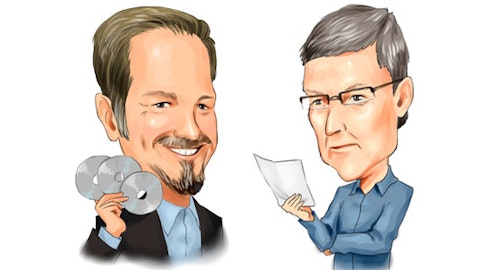For this year, we also expect CapEx to be lower than last year. So last year, we came in with around $80 million of investments. And I’d expect that to be around $60 million in 2023. And just a reminder, our CapEx levels include all of our AI investments, and we don’t expect any significant step-up in investments that you may have seen in some other firms. So just to sum up and as it relates to our modeling, as we’ve seen in the past, when we outperform on the top line, that usually drops down to the bottom line as happened in Q1 and Q2 of this year. And we’re very comfortable with where things stand and cautiously optimistic about our business for the rest of the year.
Operator: The next question is from Shweta Khajuria with Evercore ISI.
Shweta Khajuria: Jeff, I have a question on cookie deprecation. So you touched on this in your prepared remarks, and there’s quite a bit of focus on it given that we are coming close to 2024 here and Google’s plan to deprecate cookies. Would love to hear your thoughts on you think the magnitude of impact on Trade Desk, in particular, why you think it’s not going to be meaningful and the overall industry, how you think about the impact? A – Jeff Green You bet. Thanks Shweta, I appreciate the question. So first, let me just say, we’ve been down this path before. So when Safari made cookies go away, there was anxiety, when GDPR first came out, there was anxiety and IDFA removal happened, there was anxiety. And in every one of those cases, our business continued to grow, and we saw very little impact, a speed bump at best.
So I see this as slightly – or not slightly, exactly the same as all of those other things. But the reason for that is because a phenomenon that is just different about our business than most other businesses that are in the space. And so we look at 12 million ad opportunities every second and we choose from those 1 million or 2 million that we want to buy. If identity is removed from – instead of it being on 6 million, it’s now a 3 million, it just informs which ones we buy differently. We’re still going to buy the same amount, and we’re still going to be informed on the vast majority of those and in part because we’ve been so strong in growing CTV as well as leveraging UID2, we have an alternative in the biggest driver of our business in CTV that is present on nearly 100% of impressions, which is way better than anything in the browsing Internet world.
So just to be clear, but this directly impacts is the browsing Internet world of everything that runs on top of Chrome. So now let me talk for a second about the industry and be a bit more holistic because hopefully, I’ve made my point that I don’t believe this impacts us in any meaningful way. And in fact, I think you can make the argument that it affects us in a positive way just as much as it does in a negative way just because it would be negative to all the players that are dependent on cookies and because so much of our business now is driven off of UID2 and CTV, I think you can make the argument that we would benefit from sort of hurting lots of the independent competition. It is actually for that reason that I believe it is a strategic mistake for Google to get rid of cookies.
And as they’re facing more antitrust scrutiny rather than any other regulatory scrutiny, I don’t think it’s in their best interest to do, I think, because of the way that the case dates are stacking up that they won’t likely make any decisions until the end of Q1 next year. If they do make cookies go away then, I do think it will be very bad for some publishers, especially those touching journalism, that were historically print journalists, I do believe that will really have a bad effect upon them. And it won’t have a great effect on the open Internet. But I do think it will be good for us. I do think that many of the consumer data companies will actually be better off because nearly all of their data is anchored off of an e-mail address.
And the way that we leverage data is just much, much better in a world built around UID2. So I do think that it would accelerate the adoption of UID2 into the browsing Internet world, not just among CTV and audio and that would ultimately be good for us, but I don’t think there would be a quick recovery for many of the web-based publishers, especially those affecting journalism. And so it will be a net negative for the open Internet, but probably a slight positive for us.
Operator: The next question is from Vasily Karasyov from Cannonball Research.
Vasily Karasyov: Jeff, I wanted to talk about retail media. You spoke about the success you’re having with Walmart. We know that last year, there was a group of retailers that also came online. And so question number one, how is that coming along? Should we see contribution to revenue next year from those retailers? And then given that, would you be willing to update your thoughts on your plan in retail media that you gave us at your Investor Day, last October.




